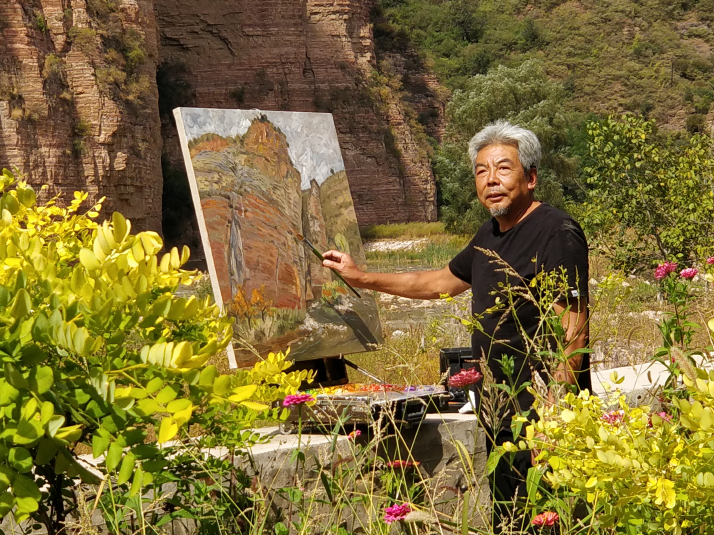| China |
| The art ambition of a county in northwest China | |
|
|
 Fan Mo paints in Zecheng on September 27
A light mist drifting from surrounding hills lingers in the county and then disappears slowly after sunrise. Early birds—sanitation workers, students going to school in twos and threes, dog walkers and morning exercisers—waken up the streets and parks. Music from loud speakers accompanying square dancers in clusters here and there flows in the air, mixing with the aroma of food wafting from restaurants serving breakfast. This is a typical morning scene in a county in north China. The county, Zuoquan in Shanxi Province, is named after a general of the Communist Party of China-led Eighth Route Army, who was killed by the Japanese invading army here in 1942. Symbols of the heroism can be spotted here and there in the county, from the statue of Zuo standing in the county center square to a bridge named the Red Army Bridge not far from it. Mountain villages The rolling Taihang Mountains, where the county is nestled, provided ideal geographical advantages for guerrilla forces during wartime, but have hampered the development of modern transportation. Despite the rapid sprawl of China's express railway network in recent years, the county has no access to even a regular railway. The closest express railway station is a 1.5-hour car ride away. The villages of the county, lying deep in the mountains and away from modern industry and pollution, have managed to maintain their original lifestyles for decades longer than elsewhere. This, along with the stunning mountain scenery, is a gift for artists seeking inspiration. "Matian Town in Zuoquan has been a base for plein air painting, or outdoor painting, in China since the 1960s and 1970s," Fan Mo, a 60-year-old oil painter born in Matian, told Beijing Review. "Several villages deep in the Taihang Mountains boast time-honored houses, providing a visual feast for painters." His passion for painting was ignited by a painter who visited Matian in 1976. At the age of 20, Fan enrolled in Shanxi University, learning oil painting, and then taught the art at Taiyuan Normal University. Each year, he goes back to Matian and paints outdoors for days. With his paint brushes, he wants to depict how people in Matian and Zuoquan cope with such hard conditions and live in harmony with nature. "The conditions for plein air painting in the mountains were very harsh before," he said. "Sometimes we had to stay at the houses of villagers who could barely provide guests with even basic amenities." Zecheng Village in Matian took the lead to create better conditions for these painters. In May 2021, the International Plein Air Base in Northern China was set up in Zecheng. Some old houses were renovated and galleries, bed and breakfast inns, restaurants and cafes have been established to create a much more friendly environment for the artists. Twenty-one colleges, including Shanxi University and Taiyuan Normal University, have made this village a base for plein air painting during summer vacations. "The village now looks even more modern than the county seat," Liu Jun, one of the developers of this project said in one of the cafes in the village, where a robot makes and serves coffee to customers. On September 17, in cooperation with Beijing-based China International Communications Group, the village created a photography base. Memory of time In its neighboring Guaier Town, the art potential was realized through another medium—a movie from a much earlier time. In 1987, a movie named Old Well was released with Zhang Yimou, who later became a world-renowned film director, playing a leading character. The setting of the movie is in a village named Shiyujiao in Guaier. In 2005, the village was renamed Laojing, literally meaning "old well." The village now features more old houses, some of which have been abandoned for years. A plein air base is currently under construction at the entrance of the village. To avoid possible damage to the old houses in the village, all the new houses will be built only at the entrance. A larger project is also underway in the county's Tongyu Town. The new project is a more comprehensive one with historical museums, theaters, and a commercial center along with accommodation for painters. Both projects are expected to be completed by the end of this year. "More villages will be included in the chain of plein air base construction in the following years," Guo Fenghui, head of Zuoquan, told reporters on September 16. "We hope more people will come here to enjoy the charm of Zuoquan." Printed edition title: To Color the Mountains Copyedited G.P. Wilson Comments to yuanyuan@cicgamericas.com |
|
||||||||||||||||||||||||||||
|